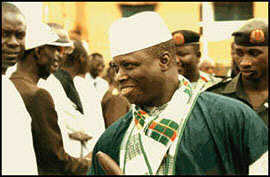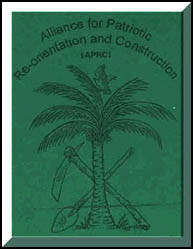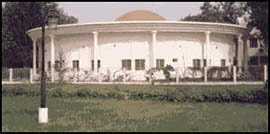 GOVERNMENT GOVERNMENT |
Contact between the Gambia and Western Europe commenced in the fifteenth century when Portuguese explorers landed on what later became known as St. Mary's Island in 1445. Subsequently, the area was visited by the French, and later by the British who proceeded to establish strong trading posts at Fort Bullen (in Barra), Fort Louvell on the island of Banjul (then Bathurst) and James Island, all strategic points which conferred to them sole control over the rest of the area.
Colonial control over the Gambia, comprising the island of Bathurst and the adjoining Kombo St. Mary area, was established about the seventeenth century. By about the mid-eighteenth century, the rest of the country was declared a protectorate of the British crown and administered by a resident governor through a mixed system of direct and indirect rule, with the latter being executed through local chiefs.

Internal self-government was attained in 1963 and full independent status confer-red on 18 February 1965. The country became a sovereign republic within the British Commonwealth of Nations by 1969. Cordial relations and close cooperation are maintained with the Gambia's immediate neighbor, the French-speaking Senegal, which crystallized into a confederate arrangement that became known as the Senegambia Confederation in 1982. That Confederation was subsequently dissolved with the mutual consent of both partners, but privileged relations continue to exist between the two countries.
Maintenance of democracy, adherence to the rule of law and preservation of fundamental humans rights constitute an integral part of the Gambia's political framework. Since independence, The Gambia was ruled by one political party, the People's Progressive Party, led by Sir Dawda Kairaba Jawara until the change of government in 1994.
The Gambia has a multi-party political system. The Constitution of the Second Republic of The Gambia provides for elections by universal adult suffrage to adults 18 and above through secret ballot to be held every five years to elect 45 candidates who constitute the country's National Assembly, complemented by 4 nominated members.

Four political parties contested in the September 1996 Presidential elections. The Alliance for Patriotic Re-Orientation and Construction (APRC) candidate Yahya Jammeh won 56% of the votes while Mr. Ousainou Darboe of the United Democratic Party (UDP) received 36%. The candidates of The National Reconciliation Party (NRP) and the People's Democratic Organization for Independence and Socialism (PDOIS) shared the remaining votes. Yahya Jammeh was sworn in as first President of the Second Republic of The Gambia on October18, 1996.
| National Assembly elections were held in January 1997. The APRC won 33 seats, the UDP 7 seats, the NRP 2 seats, the PDOIS 1 seat and independents 2 seats. In addition, 4 more members, among whom the Speaker and Deputy Speaker were nominated by President Jammeh, bring the total number of National Assembly members to 49.
For administrative purposes, the country is divided into the capital territory (seat of Government), the adjoining Kombo St. Mary area and the provinces. The provinces are in turn divided into five divisions, each headed by a commissioner, with each division further subdivided into districts locally administered by head chiefs.
 The Judiciary The Judiciary |

The judicial system is similar to those found in other countries with common law jurisdiction. There is only one system of courts, which form a hierarchy. The subordinate courts consist of Khadis' courts, district tribunals and magistrate courts. These courts have limited jurisdiction to hear both civil and criminal matters. At the higher level are the Supreme Court, the Court of Appeal and the Privy Council, the latter being the highest court of appeal for the Gambia.
Cases may be appealed successively from the lower to the higher courts in accordance with the procedure governing this process. Equality under the law is the most significant characteristic of the judicial system.
 International Relations International Relations |
Since independence, The Gambia has developed international relations through both multilateral organizations and bilateral connections with various countries. It became a member of both the Commonwealth and the United Nations in the same year as independence, 1965. It also joined various international bodies and specialized institutions, including the Food and Agriculture Organization of the United Nations (FAO), the International Labor Organization (ILO), the International Monetary Fund (IMF), the United Nations Educational, Social and Cultural Organization (UNESCO), UNIDO, the World Health Organization (WHO) and the World Bank. The country is also a member of the African Development Bank (AFDB), ECOWAS, the Economic Commission for Africa (ECA), the General Agreement on Tariffs and Trade (GATT) and is a signatory to the Lom6 Convention, a trade and aid agreement between EEC and some 66 African, Caribbean and Pacific Group of States (ACP Group), including 45 African States, which, inter alia, guarantees duty free entry into the EEC for certain goods produced by ACP countries. In March of 1988 The Gambia became a member of the UN Security Council for a two-year term. It held the Presidency of Council for the duration of the same month.
In addition to the legal safeguards available in the Constitution to protect foreign investment against non-commercial risks, agreements can be made to provide for arbitration under the auspices of ICSID, an agency of the World Bank. The Gambia is also a member of MIGA, also sponsored by the World Bank. |

